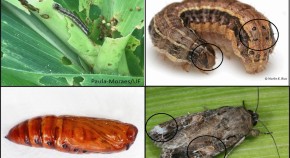Collection
Spread of the fall armyworm (Spodoptera frugiperda): preventive measures, monitoring, and control strategies
- Submission status
- Open
- Open for submission from
- 30 April 2024
- Submission deadline
- Ongoing
The fall armyworm (FAW) is one of the most destructive insect pests that can cause significant damage to a high number of crops. To avoid the spread of fall armyworm and minimize its impact on agricultural productivity, a combination of preventive measures, monitoring, and control strategies can be implemented. Combating the spread of fall armyworm requires a comprehensive and collaborative approach that involves farmers, researchers, extension services, and policymakers. Early intervention, sustainable practices, and knowledge-sharing are key components of successful fall armyworm management strategies.
In this article collection we call for the submission of manuscripts (preferably review articles, perspectives papers and original articles) on these specific aspects:
- Early Detection and Monitoring: Implementation of regular scouting and monitoring programs to detect the presence of fall armyworm at its early stages. Early detection allows for timely intervention before populations become widespread and damaging.
- Use of Resistant Varieties: Crop varieties that are resistant or less susceptible to fall armyworm. Breeding and cultivating resistant varieties to reduce the impact of the pest on crops.
- Crop Rotation and Diversification: Practices of crop rotation and diversification to disrupt the life cycle of fall armyworm and reduce its population. This can involve planting crops that are less attractive or suitable for the pest in alternating seasons.
- Biological Control: Encouragement of natural enemies of fall armyworm, such as predators and parasitoids, to help control its population. This includes promoting the presence of beneficial insects like parasitic wasps that attack fall armyworm eggs and larvae.
- Integrated Pest Management (IPM): Implementation of IPM strategies that combine multiple control methods, such as biological control, cultural practices, and judicious use of pesticides and alternatives to chemical-synthetic pesticides.
- Farmer Training and Education: Education programs for farmers about the identification of fall armyworm and its life cycle. Training schedules that include information on the pest's behavior, preferred host plants, and the signs of infestation. Equipment for farmers to distinguish between fall armyworm damage and other crop issues. Community engagement and collaboration strategies.
Articles (10 in this collection)
-
-
The chemical composition and biological activities of plant essential oils against Spodoptera frugiperda (J.E. Smith) (Lepidoptera: Noctuidae)
Authors (first, second and last of 8)
- Nimra Altaf
- Muhammad Irfan Ullah
- Samy M. Sayed
- Content type: Original Article
- Published: 25 March 2024
- Pages: 705 - 717
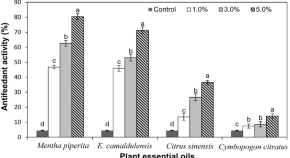
-
Virulence of Philippine entomopathogenic nematode isolates against strains of fall armyworm, Spodoptera frugiperda (J.E. Smith) (Lepidoptera: Noctuidae)
Authors (first, second and last of 6)
- Gerald M. Duza
- Romnick A. Latina
- Barbara L. Caoili
- Content type: Original Article
- Published: 25 February 2024
- Pages: 459 - 464
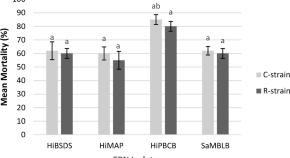
-
Survival and development of Spodoptera frugiperda (J. E. Smith, 1797) (Lepidoptera: Noctuidae) on Conyza bonariensis L. and Amaranthus viridis L.
Authors (first, second and last of 7)
- Cristiano Fortuna
- Daniela Godoy
- Oderlei Bernardi
- Content type: Original Article
- Published: 27 January 2024
- Pages: 465 - 470
-
Efficiency of female age of egg parasitoids on parasitism of Spodoptera frugiperda (J. E. Smith) (Lepidoptera: Noctuidae) eggs of various ages
Authors (first, second and last of 6)
- K. Veena
- Arunkumar Hosamani
- Sharanabasappa S. Deshmukh
- Content type: Original Article
- Published: 18 December 2023
- Pages: 471 - 478
-
Efficiency of spinetoram on biological, biochemical, and histological parameters in the invasive fall armyworm Spodoptera frugiperda (Lepidoptera: Noctuidae) in Egypt
Authors (first, second and last of 4)
- Sherehan A. R. Salem
- Ebrahim M. E. Alhousini
- Mervat A. B. Mahmoud
- Content type: Original Article
- Published: 04 December 2023
- Pages: 489 - 499
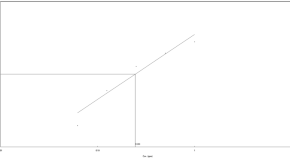
-
Damage evaluations of the maize pests’ complex: a comparative injuriousness of fall armyworm and stem borers under subsistence maize cultivation techniques
Authors
- Clovis Bessong Tanyi
- Thomas Eku Njock
- Nelson Neba Ntonifor
- Content type: Original Article
- Published: 03 December 2023
- Pages: 479 - 487

-
Analysis of Fall armyworm infestations on rainy season crops under different cropping systems in two agroecological zones in Burkina Faso, West Africa
Authors (first, second and last of 5)
- Idrissa Compaoré
- Manoé R. Sanou
- Antoine Sanon
- Content type: Original Article
- Published: 19 September 2023
- Pages: 1207 - 1216

-
Synergized toxicity exhibited by indigenous entomopathogenic fungal strains, plant extracts and synthetic insecticides against fall armyworm Spodoptera frugiperda (J.E. Smith) under laboratory and semi-field conditions
Authors (first, second and last of 8)
- Kanwer Shahzad Ahmed
- Muhammad Zeeshan Majeed
- Abu Bakar Muhammad Raza
- Content type: Original Article
- Published: 31 August 2023
- Pages: 1217 - 1228
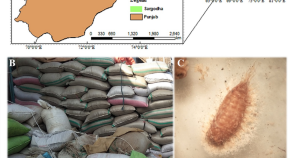
-
The invasive fall armyworm, Spodoptera frugiperda, in Africa and Asia: responding to the food security challenge, with priorities for integrated pest management research
Authors (first, second and last of 7)
- Esayas Mendesil
- Tadele Tefera
- W. D. Hutchison
- Content type: Review
- Published: 22 July 2023
- Pages: 1175 - 1206
